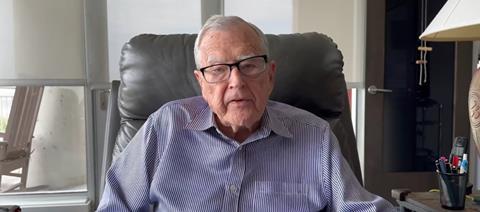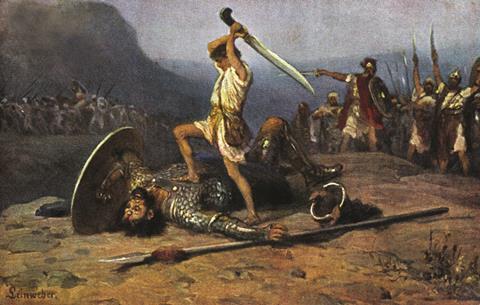My finest hour won’t be my greatest sermon or book, says RT Kendall. Drawing inspiration from the life of David, the Bible teacher explains what his finest hour will look like, and reveals how you can have one too

In June 1940, during one of the darkest moments in British history, then-prime minister Winston Churchill made an historic speech. Against the backdrop of the fall of France, Churchill told the House of Commons: “Let us therefore brace ourselves to our duties that, if the British Empire and its Commonwealth last for 1,000 years, men will still say: ‘This was their finest hour.’”
What exactly determines one’s finest hour? It is likely to be a proud moment. Perhaps winning Wimbledon, taking gold at the Olympics or achieving a Nobel Prize.
Recently, I’ve been considering the examples of finest hours we find in the scriptures. Take, for instance, the life of King David.
Highs and lows
Some might think David’s finest hour was when he killed the giant Goliath. It was probably the best thing that ever happened to David…but it was also the worst. It gave him fame and a future, yet it led to the insane jealousy of King Saul. It was one of David’s defining moments but, in my view, it was not his finest hour.
Instead, I believe that David’s finest hour was the culmination of many events. These began when Samuel prophesied that David would be a man after God’s own heart (1 Samuel 13:14). One of the first indications of David’s character was when he refused to take advantage of Saul’s vulnerability and make himself king. Saul was seeking to kill David and David had a perfect opportunity to kill Saul first – but he refused to do so (1 Samuel 24:5; 26:9). Was this David’s finest hour? Such humility and dependence on God’s timing certainly pointed toward it. But there was more to come.
My finest hour is not the level of my profile or my best sermon
After David became king of Judah and Israel, he won one victory after another. “David made a reputation for himself when he returned from striking down eighteen thousand Edomites…The Lord made David victorious wherever he went” (2 Samuel 8:13-14, CSB). David also showed extreme kindness to Saul’s family when he invited Mephibosheth, son of Jonathan, to virtually become part of his own family (2 Samuel 9). These were proud moments, but I do not believe they revealed his finest hour.
Later, something happened which would make David look like anything but a man after God’s own heart. He committed both adultery and murder, arguably the worst sins described in the Old Testament. And he was found out. Nathan the prophet exposed David’s folly and forecast that “the sword will never leave your house” (2 Samuel 12:10, CSB). Instead of being defensive and making excuses David owned his mistake, saying: “I have sinned against the Lord” (v13).
In a very short period of time, Nathan’s prophecy began to unfold. David’s son Amnon raped his sister, Tamar. Seeking vengeance, Amnon’s brother, Absalom, murdered him. Absalom was exiled for many years but finally was allowed to return to Jerusalem. He proved to be a disloyal son, stealing the hearts of the people and turning them against David. Eventually, David had to abandon the kingship and was forced into exile.

The darkest hour
David’s darkest hour came as he journeyed eastward from Jerusalem. He crossed the Kidron brook with his loyal followers. “Everyone in the countryside was weeping loudly while all the people were marching out of the city” (2 Samuel 15:23, CSB). David appeared to be utterly finished. It looked like he was yesterday’s man. His close friend and advisor Ahithophel – whose wisdom was regarded as the very opinion of God – sided with Absalom. Deserted by friends and laughed at by enemies, David was at his lowest point.
However, the priest Zadok, whose prestige was unequalled by anybody in Jerusalem and all of Israel, came to David’s side. This must have given David hope. Not only that; Zadok arranged for the ark of the covenant to be taken out of the temple to follow King David. In doing so, Zadok sent a signal to the people that not only did the Levitical priesthood stand with David, but the glory of the ark was also with him.
David must have been very moved by Zadok’s loyalty. All David needed to do was to follow Zadok and the ark back to Jerusalem. Yet he also knew that everything that was happening was part of Nathan’s prophecy. All that had happened with Amnon, Tamar and Absalom’s betrayal was part of God’s chastening. God was ultimately behind the loss of the kingship.
David was fearful to his fingertips of interfering with what God was doing, so he instructed Zadok to take the ark back to Jerusalem: “Return the ark of God to the city. If I find favor with the LORD, he will bring me back and allow me to see both it and its dwelling place. However, if he should say, ‘I do not delight in you’, then here I am – he can do with me whatever pleases him” (2 Samuel 15:25-26, CSB).
I believe this was David’s finest hour. He showed that he desired God’s will for him more than he wanted the kingship. His fear of God transcended any personal wish he may have had to be king. He was so broken over his moral failure, and grieving the most high God, that he did not want to short-circuit God’s plan and purpose. This is when David most demonstrated that he was a man after God’s own heart.
Honesty and humility
There is no way we can gloss over David’s horrible sin. God did not gloss over it. Being a man after God’s own heart did not exempt David from being severely chastened.
It is a warning to all of us. When I think of the high-profile servants of God who have been found out to have lived secret lives in recent years, I am sobered beyond words. It is by the sheer grace of God that I have been spared of doing many of the things that others have given into. Does this make me better? Not at all. All I can do is to fall on my knees and say: “Thank you, Lord, that I have not succumbed to the sins I am so capable of committing.”
The example of David’s life also shows that we can have our finest hour, and nobody may ever know about it. My finest hour is not the level of my profile, my best sermon, the book that sells the most or who I have met. My finest hour may never be known to anybody. But David’s experience tells me that there is no greater satisfaction than pleasing God.
David did eventually get his kingship back. But God did it. And he did it without David’s vain manipulation.
Anyone can have a finest hour, and it may never be seen by anyone else at all. But if your finest hour is one in which you are humbled and learn to lean entirely upon the sovereignty of God, it will be worth it.
Their finest hour: 30 biblical figures who pleased God at great cost by RT Kendall (Thomas Nelson) is published later this month







































No comments yet